#darkening of valinor
Text


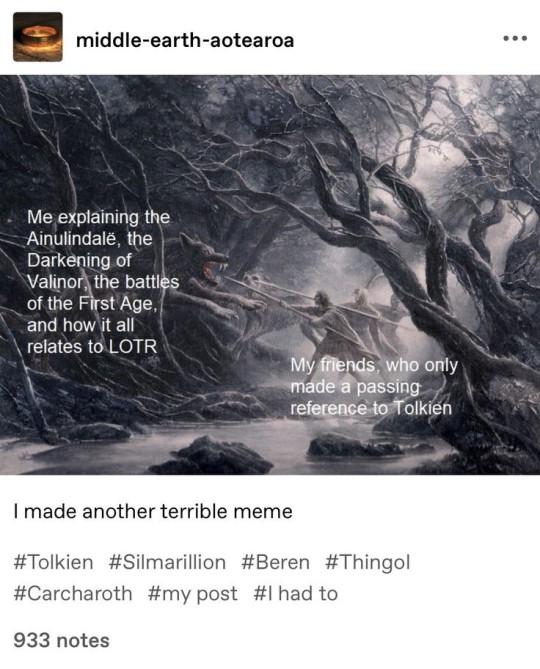
Made me laugh waaay toooo hard ⤵️

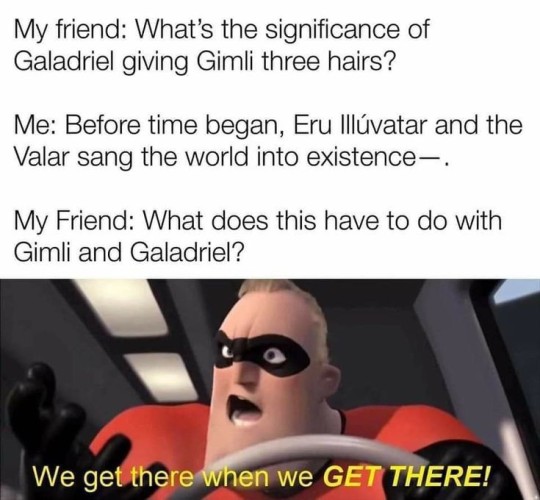


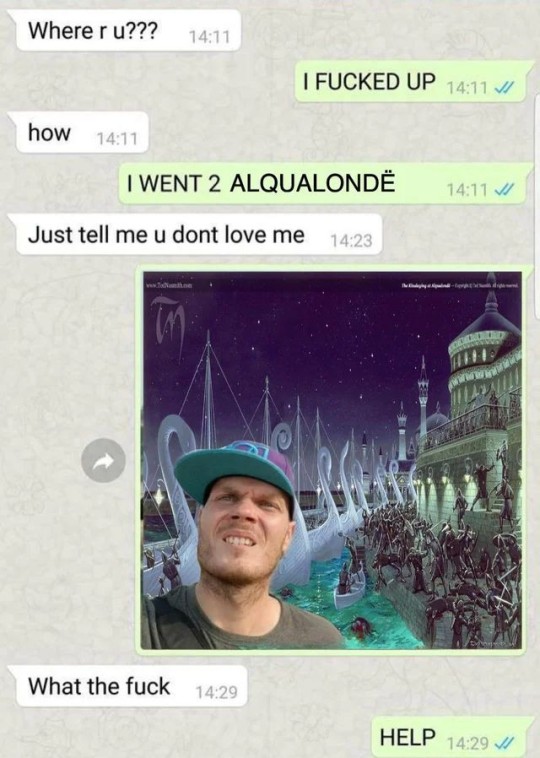
#silm memes#silmarillion#alqualonde#that fukkin fëanor#gandalf#valar#eru illuvatar#glorfindel#ainulindale#maedros chainsaw#maedhros#darkening of Valinor
241 notes
·
View notes
Photo

I am so NOT over Finwe’s death!
#Finwe#Morgoth#Melkor#Formenos#Darkening of Valinor#Theft of the silmarils#Finwe is not the greatest father#but by morninglord he will double down on defending his childs creation#if it will be the last thing he does#Anna draws#silmarillion fanart
309 notes
·
View notes
Text
I Read The Silmarillion So You Don't Have To, Part Four
Here are the previous parts:
https://nyxshadowhawk.tumblr.com/post/726120109073104896/i-read-the-silmarillion-so-you-dont-have-to-part
https://nyxshadowhawk.tumblr.com/post/726261927846772736/i-read-the-silmarillion-so-you-dont-have-to-part
https://nyxshadowhawk.tumblr.com/post/726476229805473792/i-read-the-silmarillion-so-you-dont-have-to-part
Chapter 7: Of the Silmarils and the Unrest of the Noldor
In which the peace is disturbed by conspiracy theories and shiny objects.
Fëanor decides to preserve the light of the Two Trees of Valinor… you know, in case anything ever happens to them. Somehow, using all of his knowledge and power and craftsmanship, he captures their light and uses it to create THE SILMARILS! The Silmarils are the biggest, brightest, and most beautiful gemstones in the history of Elfkind. No one but Fëanor knows what they’re made of (and at this point in time, he isn’t exactly in a position to tell anyone), but they look like diamonds and are completely unbreakable. Just as the bodies of the Children of Ilúvatar are shells for the soul, the crystal that composes the Silmarils is a shell for the light of the Two Trees — literally, the stones are actually alive. They are like three stars.

Silmarils of Fëanor by Nikulina-Helena
Side note — this isn’t technically in the text of The Silmarillion, it’s from Unfinished Tales, but I have to mention it because it’s hilarious — Fëanor got the idea to preserve the light of the Trees because Galadriel wouldn’t give him her hair. Here’s the relevant part of Unfinished Tales:
Even among the Eldar she was accounted beautiful, and her hair was held a marvel unmatched. It was golden like the hair of her father and of her foremother Indis, but richer and more radiant, for its gold was touched by some memory of the starlike silver of her mother; and the Eldar said that the light of the Two Trees, Laurelin and Telperion, had been snared in her tresses. Many thought that this saying first gave to Fëanor the thought of imprisoning and blending the light of the Trees that later took shape in his hands as the Silmarils. For Fëanor beheld the hair of Galadriel with wonder and delight. He begged three times for a tress, but Galadriel would not give him even one hair. These two kinsfolk, the greatest of the Eldar of Valinor, were unfriends for ever.
[…] there dwelt in her the noble and generous spirit of the Vanyar, and a reverence for the Valar that she could not forget. From her earliest years she had a marvellous gift of insight into the minds of others, but judged them with mercy and understanding, and she withheld her goodwill from none save only Fëanor. In him she perceived a darkness that she hated and feared, though she did not perceive that the shadow of the same evil had fallen upon the minds of all the Noldor, and upon her own.
So, just to reiterate: Galadriel is wise and benevolent and loves everyone except Fëanor, because Fëanor is just that much of an arrogant asshole. So when Fëanor asks her for her hair, she basically tells him where he can stick it, and he goes, “Well fine! I didn’t need your hair anyway! I’m going to make gems that are even prettier and shinier than your hair, and then everyone will be jealous!” And that is why it’s such a big deal that Galadriel grants Gimli’s much humbler request for her hair. Gimli may be a dwarf, but he’s actually a good person!
Anyway, everyone is impressed by the Silmarils, even the Valar themselves. Varda, the goddess of the stars, blessed them so that nothing evil could touch them.
Now, I already said that Melkor lusted for all the shiny things that the Noldor had dug up, so how do you think he reacted when he saw the Silmarils? Oh, you’d better believe he wanted those gems more than anything else in the world. He concocted an evil plan to sew as much discord between the Elves and the Valar as possible, and to destroy Fëanor in the process. Unfortunately, enough of the Elves start to listen to his rumors. They start to believe that the Valar brought them to Valinor to stop them from ruling kingdoms of their own. Melkor also told the Elves about the eventual coming of Men, which the Elves knew nothing about. Melkor didn’t know much about Men either, but it was enough to spread a conspiracy theory that Manwë was holding the Elves hostage in Valinor so that Men could take over the world, cheating the Elves out of their God-given inheritance. The Noldor start to want to go back East, to be free of the Valar’s influence so they can start building kingdoms of their own and establishing themselves before the Men come.
Fëanor especially is desperate to get out of Valinor, which is exactly what Melkor wanted, because this was all just a ploy to get the Silmarils. But Fëanor is just as obsessive about them, keeping them locked deep in his “horde” (as though he’s a dragon), except when he parades around wearing them during feasts. He doesn’t let anyone see them, except for his father and his sons. He’s already started to forget that the entire point of them was to preserve the light of the Trees of Valinor, and not just to glorify himself.
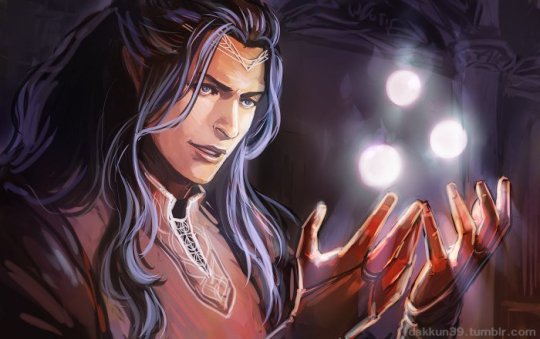
Fëanor by dakkun39
Melkor starts to zero in on his mark. He spreads a new lie that Fingolfin, Fëanor’s brother, was planning to supplant him as Finwë’s heir. And to Fingolfin, he says that Fëanor has always hated his half-brothers and plans to kick them out of the city of Tirion.
As the unrest brews, Melkor teaches the Noldor how to make weapons. Each family of Noldor believes that only they know about the weapons, and that none of the other families do. Meanwhile, Fëanor makes a secret forge to experiment with crafting weapons, so he and his family can have especially dangerous ones. Even Melkor didn’t know about that, that was all Fëanor. Mahtan, Fëanor’s father-in-law, bitterly regretted having taught him anything about metalwork.
Fëanor openly calls for revolution against the Valar, and escaping back East. That crosses a line. Finwë holds court and asks his lords what he should do. Fingolfin asks him, “Why are you letting Fëanor call all the shots? He’s not King. You’re the King. You tell him to stop!” Fëanor promptly bursts through the doors and struts up to the podium, armed to the teeth. He draws his sword on Fingolfin and tells him to fuck off. Fingolfin hastily bows to Finwë and gets the hell out of there before his own brother murders him on the house floor. Fëanor follows him and starts taunting him. Fingolfin has the good sense not to respond.
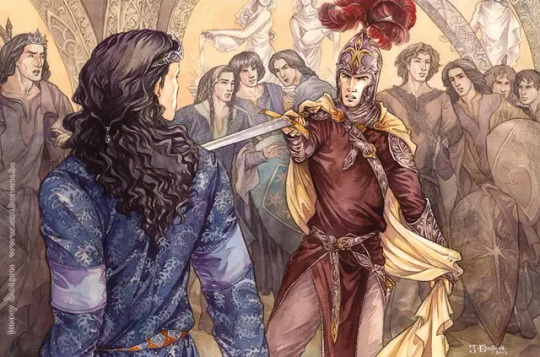
By Jenny Dolfen
Now the Valar get involved. They were sad about the Noldor wanting to leave, but whatever Melkor might say, the Valar weren’t about to keep them there against their will. This, though? This is a step too far. They summon Fëanor to stand trial before them. During the trial, it’s finally revealed that Melkor, not Fëanor, is ultimately to blame for all the unrest. Tulkas doesn’t even wait for the trial to be over to go and put Melkor’s lights out. Meanwhile Mandos (the god of death/purgatory) delivers his judgement on Fëanor: “If you’re our ‘thralls,’ then I hate to break this to you, but Manwë is the king of all of Arda, not just Valinor. So… going back East isn’t going to help you very much. Threatening to kill your brother is still a crime whether here or in Middle-earth, so I sentence you to exile from the city of Tirion for twelve years. Go and think about what you did! Then, after your time-out is over, if your family forgives you, we’ll let you back in.”
Fingolfin speaks up to say that he already forgives Fëanor, which is very charitable of him. But Fëanor just sulks and stalks off. Honestly, he’s had it easy — he hasn’t even been asked to leave Valinor, only to leave the city! He leaves with his seven sons and founds his own fortress, Formenos, some distance from Tirion, where he hoards all his gems and weapons and other sparkly things (including the Silmarils). Finwë loves Fëanor so much that he leaves his own city to be with Fëanor, and Fingolfin becomes king of Tirion in his place. So, in the end, Melkor’s lie became a self-fulfilling prophecy: Fingolfin did become King of the Noldor instead of Fëanor, not because of any treachery on his part, but because of Fëanor’s shitty behavior. Nice going, Fëanor.
Melkor lays low for a while, disguised as a cloud. No one hears anything of him for a bit, but the Trees look slightly darker and the shadows slightly more ominous. Suddenly, he turns up on Fëanor’s doorstep and pretends to be friends, using the self-fulfilling prophecy to his advantage to make it sound like everything he’s said so far is true. Melkor offers to help Fëanor leave Valinor. Fëanor still thinks that Melkor is kind of sus, but Melkor gets to him by mentioning the Silmarils, and how they won’t be safe as long as Fëanor stays in Valinor. Unfortunately for Melkor, he showed his hand too soon. Fëanor finally sees that the Silmarils are what Melkor’s really been after this whole time. He screams the equivalent of “Get the fuck out of my house!” and slams the door in the face of what is technically the most powerful being on Arda. Melkor runs off with his tail between his legs, but Finwë recognizes that this isn’t over, and calls for Manwë’s help. Manwë and the other Valar chase Melkor to the edge of Valinor, and everything is suddenly fine for a while… the Trees are bright again, and Melkor is nowhere to be seen, but not knowing where he is might actually be worse. The people of Valinor can feel him lurking on the edge of the horizon.

Fëanor and Silmarils by breath-art
Chapter 8: Of the Darkening of Valinor
In which everything goes to hell.
The Valar assume that Melkor returned to his old fortress in the north, but they didn’t find him there. Instead, Melkor shapeshifted and slunk southwards, to a shadowy land called Avathar. He was going to visit… an old friend, shall we say.
If you think Shelob is bad, you haven’t met her mother.

By John Howe
Ungoliant isn’t just a spider, she’s an eldritch abomination that happens to take the form of a spider. Even the Valar don’t really know where she came from, and she managed to escape them by hiding in the south where they weren’t turning their attention. She weaves webs that suck in all the light around them. Melkor takes the form of a tall Dark Lord and tells Ungoliant that he will feed her whatever she wants in exchange for her help in conquering Valinor (although at this point, you should already know that when Melkor promises anything, it’s with his fingers crossed behind his back). Ungoliant agrees, and they decide to attack while the people of Valinor are celebrating a harvest festival. Because whenever anysort of disaster happens, it’s when everyone is unsuspectingly having a party.
Fëanor sulkily attends the festival, only because Manwë literally ordered him to be there, but the other elves of his household (including Finwë) don’t show up. Fëanor also deliberately underdresses for the party; instead of parading around with the Silmarils like he used to, he decided that the Valar didn’t deserve to see them, and kept them locked up in his castle. Fëanor reconciles with his half-brother Fingolfin right in front of Manwë’s throne, and may even have been sincere! The Trees shine with a perfect blend of silver and gold… for the last time.
The poor Elves and the Valar barely have time to react. Melkor leaps on top of the sacred mound and strikes each Tree through with his spear, and Ungoliant drinks up all the sap that gushes out of them like blood, and they quickly wither and die. Then Ungoliant drinks up all the well water, and she looks so huge and bloated that even Melkor is afraid of her.
And… that’s it. Just like that, it’s over. The Trees are dead. The resulting darkness is almost a palpable thing that can attack the body and soul. The Valar and all the Elves gathered in Manwë’s palace are thunderstruck as the lights suddenly go out, and then, they hear the screams of the Teleri, who have had nothing to do with this whole mess and had no idea that there was any unrest in Valinor to begin with. You know what I’m reminded of? That scene in The Prince of Egypt when God kills the firstborn of every Egyptian household, and there’s a shot of Orion, a beat of silence, and then a wail of grief and despair goes up.
Manwë sends the Valar to chase after Melkor, but they can’t penetrate Ungoliant’s cloud of darkness, and it’s too late. The damage was done.

By Titita
Chapter 9: Of the Flight of the Noldor
In which the Valar have finally had enough of Fëanor’s bullshit.
Valinor is left in shock. Yavanna tries in vain to heal the Trees, but they are dead, and there’s nothing she can do… unless she had a little of the light of the Trees, which Fëanor fortunately preserved in the Silmarils. Manwë asks Fëanor if he will give Yavanna a Silmaril. Fëanor whines that just as the Trees were Yavanna’s masterpiece, the Silmarils are his masterpiece, and if he breaks any one of them, he’ll be the first of the Elves to die. Mandos mutters that he wouldn’t be the first, since his mother Míriel died, but no one takes his meaning.
Fëanor goes off to sulk, and remembers what Melkor said: that the Valar want the Silmarils, and will do anything to get them. Now they’re asking him to give them one. Fëanor concludes that because Melkor, a Vala, is such a shitty person, then all the other Valar must be the same. He tells the Valar that he will not give them a Silmaril, and that if they try to take one from him by force, then that will prove that they really are just as bad as Melkor.
That’s that, then. Because Fëanor is such a selfish asshole, the Trees are not healed, and there’s nothing left to do but to mourn. Nienna, the goddess of sorrow, stands on top of the mound where the Trees used to be and laments the scarring of Arda, letting her tears wash away the destruction caused by Ungoliant and Melkor.
Then Elves from Formenos, Fëanor’s fortress, arrive to tell the Valar about another of Melkor’s crimes: He broke into Formenos, murdered Finwë, and stole everything that was in Fëanor’s treasure horde. The Silmarils are gone. Fëanor is enraged, firstly because the Silmarils are gone, secondly because he was at Manwë’s stupid party instead of defending his castle, and thirdly because his beloved father is dead. This is when he first calls Melkor by the name Morgoth (which is what he’ll be called for the rest of the Silmarillion).
History might have been different if Fëanor had originally said yes to Yavanna’s request, before learning that Morgoth had stolen the Silmarils. We can’t know.
Meanwhile Morgoth and Ungoliant take the long way back to Middle-earth. Morgoth hopes to eventually escape from Ungoliant, because even he’s afraid of her, but she catches on. She tells Morgoth that she’s still hungry, and she wants to eat all the treasure he stole from Formenos. So Morgoth, begrudgingly, feeds her all of Fëanor’s beautiful gemstones. All but three, that is. The Silmarils literally burn Morgoth’s hand, because Varda made them evil-proof, but he grips them tightly and refuses to give them to her. He’s a lot weaker than he should be because he lent Ungoliant so much of his power, and she weaves a web of darkness to strangle him. Melkor screams so loud that his screaming can still be heard in that region to this day. Deep beneath the ruins of Angband, the Balrogs still lurked, and when they heard their Lord cry for help, they came to save him. Let’s just reiterate that: Ungoliant is so evil that Morgoth, who’s like Sauron but worse, needed Balrogs to save him from her.
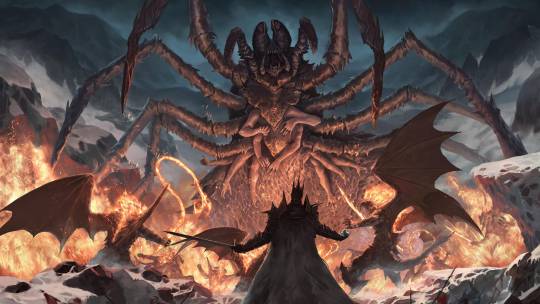
By Sheppi-Arthouse
Ungoliant fled, and lurked for some time in a dark valley where she mated with other spider-creatures and ate their heads. No one knows what happened to her after that. She might still be out there, but one legend says that eventually, in her eternal hunger, she ate herself.
Morgoth rebuilds Angband, amasses his armies of Balrogs and Orcs, and gives himself the modest title of “King of the World.” He forges himself an iron crown and sets the three Silmarils in it. But his hands are permanently burned by having held them, and he can never take off the crown. He stews in his hatred, and vents his humiliation at the eight spidery legs of Ungoliant by abusing his minions. Despite how pathetic that near-defeat was, Melkor is still technically a Vala, and is so terrifying in his majesty that no one can even be near him without being consumed by fear.

By NeexSethe
Back in Valinor, everyone is depressed. Then Fëanor shows up and gives a rousing speech to the Noldor, mostly condemning Morgoth, but also repeating all of the lies that Morgoth had spread about the Valar. Fëanor declares himself King of the Noldor since his father is dead (which isn’t anything like what Morgoth just did), and persuades the Noldor that they shouldn’t live under the Valar’s rule anymore. After all, the Valar failed to keep out Morgoth, and they’re related to him so they must be partly to blame for his actions. Fëanor doesn’t want to be anywhere near the distant cousins of the guy who killed his father. Also, look at the greener grass back in Middle-earth where the Noldor can build an empire for themselves! They can become a warlike people, and conquer Middle-earth before the Men come! Fëanor throws some racial supremacy into the mix and says that once the Noldor have waged war on Morgoth and taken back the Silmarils, they alone will be the lords of the last remaining Light.
Then Fëanor and his sons draw their swords and swear an oath that they will hunt to the ends of the earth any creature — Vala, Demon, Elf, or Man — who possesses a Silmaril.
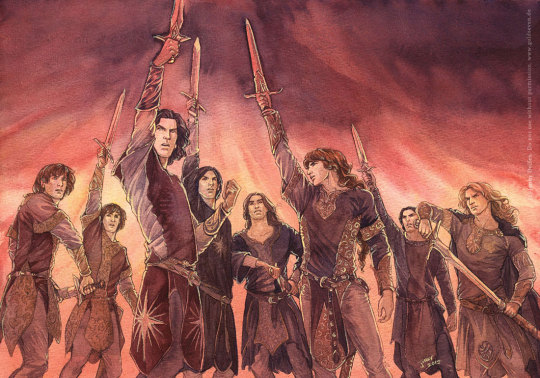
By Jenny Dolfen
Despite having just disavowed the Valar, this oath is still sworn with the gods and their sacred mountain as witnesses, so… old religious habits die hard.
Immediately, unrest erupts among the Noldor. Fingolfin and his son Turgon are horrified, Finarfin (Fëanor’s other brother) tries to calm everything down, and Galadriel (the only woman there) likes the idea of seeing Middle-earth and ruling a realm of her own. Fëanor’s side of the debate eventually wins, and the Noldor depart for Middle-earth. Fëanor hurries them out of there before they have the chance to change their minds.
Of course, the remaining problem is that Fëanor can’t simply declare himself king so easily. Fingolfin has been King of the Noldor ever since Fëanor was exiled from the city, and most of the Noldor are still loyal to him. He’s also level-headed and kind, whereas Fëanor is a hot mess. Fingolfin doesn’t want to leave Valinor, but accepts that he doesn’t have much of a choice, because he doesn’t want to abandon his people. Also, his son Fingon is urging him to go. Finarfin is even less willing to leave, but follows Fingolfin anyway for similar reasons.

By BellaBergolts
As the Noldor are leaving, a messenger arrives from Manwë. He says that the Valar won’t prevent the Noldor from leaving, since the Elves are free to do whatever they want, but that the Valar strongly advise against it. But Fëanor and his family are explicitly exiled from Valinor, on account of their oath. The messenger emphasizes that Fëanor is right — Melkor is a Vala —which is exactly why Fëanor and co. stand no chance against him or against any of the other Valar. So, the oath is impossible to fulfill. That sucks, because oaths are serious business, and once you’ve made an oath, you can’t simply disregard it. Fëanor has basically condemned himself and all of his sons to an impossible, borderline-blasphemous and utterly hubristic venture. Nice going, Fëanor.
Of course, Fëanor gives a typical arrogant response, urging the Noldor not to send their king into exile and “return to bondage.” He says to the messenger, “Go tell Manwë that even if I can’t beat Morgoth, at least I’m gonna try, instead of sitting on my sorry ass and grieving! My battle with Morgoth is gonna be so legendary that one day the Valar will realize I was right!” Fëanor is so intimidating that even the messenger of Manwë bows to him in response. And so, the Noldor leave into exile — some boldly and without looking back, some very reluctantly.
They quickly run into the first big problem: How do they get to Middle-earth? Fëanor first tries to follow Melkor and go north, to cross the narrow strip of land that connects the two continents. But realistically, there’s no way that an entire nation’s worth of people are going to cover that distance. The other option is to cross the sea itself, but the only way to do that is with ships, and the Noldor don’t know how to build them. Fëanor decides to persuade the Teleri to join his company, which would get them the ships they need — and spitefully, Fëanor hopes to further dismantle Valinor and gain himself more soldiers for his war against Morgoth.
The Teleri are sad that their friends are leaving, and completely unwilling to lend them any ships or go against the will of the Valar. Olwë, the King of the Teleri, never heard any of Morgoth’s conspiracy theories, so everything Fëanor says sounds completely insane. You can imagine how well that went over with Fëanor. He’s like, “You owe us because we helped you build your city! You stragglers would still be living in mud huts if it weren’t for us!” Olwë points out that friends don’t let friends make such stupid decisions, that the plan was to live together in Valinor forever, and that the Noldor didn’t teach the Teleri shipbuilding. They learned to build ships on their own, directly from the sea gods, and don’t owe the Noldor anything. The Teleri feel the same way about their ships as Fëanor does about his jewels — they’re unique masterpieces, and can never be replicated.
Fëanor doesn’t take no for an answer, and tries to take the ships by force. The Teleri fight back. What follows is the first large-scale battle between Elves. It’s brutal and sad — there’s deaths on both sides, but the Noldor win and steal the precious ships away. (Don’t ask me how the Noldor know how to sail the ships — sailing isn’t exactly a skill that one can just pick up.) Olwë calls upon Ossë, the Maia of the Waves, but he doesn’t come, because the Valar swore to neither help nor hinder the Noldor’s departure. But Uinen, the Maia of sea life, is so distraught over the cruel deaths of the Teleri mariners that she wrecks several of the ships.

By Ted Nasmith
When the Noldor reach the shore, a dark figure rises up from the cold mountains. Some say the figure was Mandos himself. He pronounces the “Prophecy of the North”: Anyone who’s studied pagan mythology knows that kinslaying is just about the worst thing you can do, so now all the Noldor are exiled, not just Fëanor and his sons. But Fëanor has well and truly brought down the wrath of the Valar upon his head. They’ve given him enough second chances. Now, his oath isn’t just useless — it’s actively a curse that will destroy his family, drive them to evil and treason, and keep the Silmarils forever just out of reach. After they die — and they will die, despite the immortality granted to them by Eru Ilúvatar — their souls will return to the Halls of Mandos as ghosts. The Noldor who don’t die will slowly diminish, and watch their own power fade as the other races gradually supplant them, leaving them with nothing but regret.
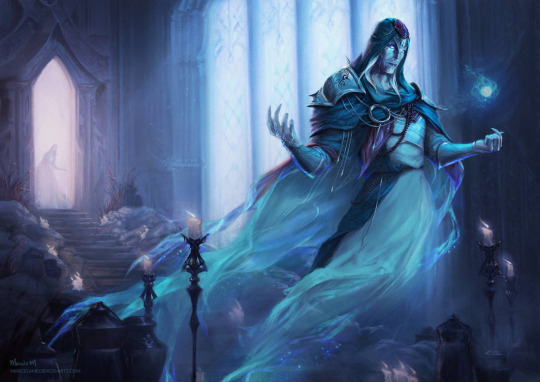
Mandos by marcelamedeiros_arts
Don’t let anyone tell you that Tolkien’s Elves are all perfect beings who are prettier, wiser, more magical, and otherwise superior to everyone else. The reason why all the Elves of the LotR fit that description is because only the wise Elves last that long. All the arrogant, hotheaded, and power-hungry Elves don’t make it to the Third Age because they’ve all killed each other by then.
Case in point, Fëanor responds to this imposing figure pronouncing the wrath of the gods with his typical arrogance, insisting that he and his family are not cowards and that treason is just another evil that they’ll have to deal with. And, as an extra “fuck you,” that everyone will sing of their deeds until the end of the world.
At that, Finarfin turns back. He never actually wanted to leave Valinor, he hates that the battle ruined his friendship with Olwë, and he’s deeply resentful towards the House of Fëanor for having caused this whole mess. He and his people receive the Valar’s forgiveness, and return to their beautiful city of Tirion. Finarfin rules over the Noldor that returned with him, but without his children, because they didn’t turn back. They wanted to stay with Fingolfin’s sons, Fingon and Turgon, and they aren’t the sort of people to abandon a task halfway, so they continue on.
Fëanor, Fingolfin, and the other Noldor reach the far north, where the continents of Aman and Middle-earth meet. They’re cold, hungry, and don’t know which way to go next. Some of the Elves are starting to catch on that Fëanor and his propaganda is the cause of all their trouble. Fëanor is already starting to fear treachery, so he takes his sons and all the ships, and straight-up abandons Fingolfin and his people to freeze to death. Fëanor becomes the first Noldor Elf to set foot on Middle-earth.
Maedhros, Fëanor’s eldest son, asks him if he’ll send any ships back for Fingolfin’s people (specifically Fingon). Fëanor laughs at his son, calls his brother and nephews and all their people “worthless baggage,” and then burns the ships. Maedhros just stands aside and lets him do it. (I’m guessing that the inability of Fëanor’s kids to stand up to their father is going to become a recurring source of conflict.) So, the curse has already come into effect.

The Burning of the Ships by Ted Nasmith
In spite of Fëanor, Fingolfin and his company pass through the icy wastes in the farthest north, and eventually reach Middle-earth, though they lost many along the way. The narrator tells us straight-up that few of the deeds of the Noldor will ever surpass that desperate crossing.
We're a quarter of the way through!
Next part: https://nyxshadowhawk.tumblr.com/post/738735962858897408/i-read-the-silmarillion-so-you-dont-have-to-part
#the silmarillion#silmarillion#tolkien#jrr tolkien#the lord of the rings#lotr#summary#feanor#fingolfin#melkor#morgoth#valar#mandos#ungoliant#silm#noldor#silm art#silm fanart#silmarils#darkening of valinor#valinor#oath of feanor#teleri#elves#tolkien elves#silm elves
53 notes
·
View notes
Note
could i please request turgon and/or idril for the art requests? thank you so much, i love your art!

@swanmaids thanks! Here they are during the Darkening
#hc that it later bothers idril that she was too young to form memories of those councils beyond ‘ppl yelling’#bc she would like to know what motivated elenwe to come to beleriand#which turgon wouldn’t talk abt/aredhel is only a so-so source for bc she gets bored of the background geopolitics#swanmaids#my art#tolkien#idril#turgon#darkening of valinor#I like that they essentially hv the same hairstyle
35 notes
·
View notes
Text
I climbed a mountain
Late submission for @finweanladiesweek for Findis:
This is a drabble written earlier this year but not posted publicly yet.
It is set during the Darkening, after Finwe's death.
‘I am so sorry, Mother, I cannot come to Valmar with you, even now,’ said Findis.
They stood on the slopes of Taniquetil. There was no light, of course there was still no light, except for starlight faintly reflecting off patches of snow.
Indis could not even see Tuna and the Calacirya, now, where her life and love had ended brutally as if buried in a landslide, merely glimpse the walls of the Pelori as a deeper shadow.
‘I can neither dwell among Vanyar nor in Tirion,’ said Findis, embracing her. ‘Know you take my love down with you, nevertheless.’
This fixed-length drabble features Himring 'verse Findis the hermit, who was introduced elsewhere. This is an uncanonical choice, but I wanted to write her as someone who is committed to Vanyarin religious practice, but is temperamentally distinctly Finwean, giving a different take on that mixed heritage.
The prompt for this was Fleetwood Mac's Landslide.
25 notes
·
View notes
Text
Whenever I see people talking about the Uprising of the Noldor, it seems like the predominant opinion (and the “canon” opinion, so to speak) is that they fucked up. Kinslaying aside, people seem to think that it was a mistake to rebel against the Valar at all, like the Noldor’s path was flawed from the moment they decided not to listen to Manwë.
I’m here to argue the opposite point.
It was the Valar who were wrong.
If you’ve ever been a leader in any capacity (as I have), you should know that it’s your responsibility to make sure the people you are leading are safe. You need to give them a reason to continue following you, and you need to continuously build up trust and maintain that trust between you and your people.
The first mistake the Valar made was believing Melkor had reformed and letting him roam free among the Elves in Valinor. That was a massive oversight on their part, but they still could have saved themselves even after making that big of a mistake. They could have - and should have - acted immediately to recapture Melkor the moment there was dissidence among the Elves. But instead, they blamed Feanor alone and didn’t think to ask who had been whispering in his ear.
The fact that they didn’t recapture Melkor of course allowed the problem to get worse. That is what happens if there’s an issue that you choose to ignore instead of solve, after all. So Melkor continued to sow discord under their watch.
And then, ultimately, of course, he allied with Ungoliant, killed Finwe, stole the Silmarils, and drained the light of the Trees.
At this point, the Noldor are (understandably) ready to riot. Their king - the one who led them to this land in the first place, who believed it was a sanctuary! - has just been murdered. In the Undying Lands. By one of the Valar. This is unprecedented and they are raging. And the Valar’s response at this point is to say they can’t catch Melkor because he’s already gone, and to sit at the foot of the darkened Trees and mourn. That’s it.
They don’t address the cause of the Noldor’s grief or rage, they don’t even seem to realize that they have a part to play in that. Which, once again, as a leader, if you do not respond appropriately and immediately to a crisis you caused, then the escalation of that crisis is on your hands.
The Noldor go back to Tirion with absolutely zero of their needs met, all of their rage still boiling inside them, and completely justified in believing that the Valar are not going to help them. The Valar have literally proven that themselves! In which case, the only options left to the Noldor are to sit and do nothing (like the Valar are doing, which doesn’t work) or solve their problem themselves.
“Why, O people of the Noldor, should we longer serve the jealous Valar, who cannot keep us nor even their own realm secure from their Enemy?”
The Uprising is inevitable at this point.
#silmarillion#tolkien#darkening of valinor#just noldor things#obligatory fuck the valar tag#uprising of the noldor#my posts
104 notes
·
View notes
Text
Playing with the idea of an Eärwen who looks at the destruction after the First Kinslaying and thinks that maybe it's better if it all breaks down before it's reconstructed. She glances at the sea she longs for and cannot cross, the blood on the docks lapping into the waters; someone knocked over a lamp and there is fire, but nothing so devastating that it can outdo the mesmerizing waves. The attack just now was high tide, giant waves crashing down upon them all, and unready Alqualondë was devastated by it - but there is more conflict to come. It's inevitable, and she knows better than to deny it. Already people panic in the darkness, the stars providing cold comfort without Telperion visible in the distance.
Let whatever comes play through. Let people grieve, and blame one another, and scramble for easy fixes that do not exist. And then, after they are broken down to their bare essentials - that's when she can begin to rebuild. That's when she can change. She's quite experienced at balancing priorities, being an ambassador of worlds; she can rebuild Alqualondë, and Valinor besides, and it will be different, suited for a world that has been suddenly sundered. The details are still unclear, but nothing is clear yet. She can wait.
(At the same time, Arafinwë scrambles to reknit and construct a working system out of the remains of the Noldor, trying to implement solutions but unsure exactly how. I think it would make an interesting contrast, with Arafinwë trying to preserve what's left of the old system while Eärwen plans for change, especially since they're probably not on speaking terms at the moment.)
#earwen#trying to figure out Earwen's character I feel like she's outwardly calm and joyful but restrains herself a lot#finarfin#arafinwe#alqualonde#first kinslaying#the silmarillion#silmarillion#tolkien#darkening of valinor
20 notes
·
View notes
Text




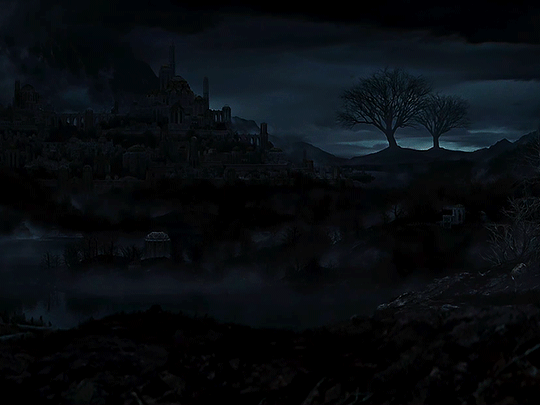
THE DARKENING OF VALINOR in The Lord of the Rings: The Rings of Power, Episode 1 "A Shadow of the Past" Dir. J. A. Bayona
#creation requires sacrifice#tolkien gave me life#1x01 a shadow of the past#valinor#rings of power#darkening of valinor#the darkening of valinor#tirion#laurelin#telperion#morgoth#ungoliant
113 notes
·
View notes
Link
Chapters: 1/1
Fandom: The Silmarillion and other histories of Middle-Earth - J. R. R. Tolkien
Rating: General Audiences
Warnings: No Archive Warnings Apply, Underage
Additional Tags: Valinor, The Two Trees, death of the two trees
Summary:
It is said that the last flower of Telperion and the last fruit of Laurelin were set into vessels and became the Sun and Moon. But what happened to all the other flowers and fruits of the Two Trees? This is written like a short memoir by one of the elves that lived through it.
#my writing#writing#fanfic#fanfiction#silmarillion#the silmarillion#silm#the silm#valinor#darkening of valinor#the darkening of valinor#the two trees#tolkien#jrr tolkien#the two trees of valinor#two trees of valinor#laurelin#telperion
8 notes
·
View notes
Photo


Silmarillion AU: The Ballet
Yavanna raised up two trees of silver and of gold, whose light illuminated Valinor. But Melkor, jealous of their beauty, seduced the evil spirit Ungoliant and she drank the light of the trees until they were drained and withered and died, and all of Valinor fell into darkness. Then Nienna lay upon the withered mound of the two trees, and wept.
Hee Seo as Yavanna, Xin Ying as Ungoliant, Sergei Polunin as Melkor, Gillian Murphy as Nienna
#silmedit#silmarillion#ballet au#two trees of valinor#darkening of valinor#ungoliant#melkor#nienna#yavanna#hee seo#xin ying#sergei polunin#gillian muphy
47 notes
·
View notes
Quote
Varda looked down from Taniquetil, and beheld the Shadow soaring up in sudden towers of gloom; Valmar had foundered in a deep sea of night. Soon the Holy Mountain stood alone, a last island in a world that was drowned. All song ceased. There was silence in Valinor, and no sound could be heard, save only from afar there came on the wind through the pass of the mountains the wailing of the Teleri like the cold cry of gulls. For it blew chill from the East in that hour, and the vast shadows of the sea were rolled against the walls of the shore.
Of the Darkening of Valinor
90 notes
·
View notes
Text
Wonder what the Darkening must have been like for those in middleearth, not just for the elves but pretty much everybody. Up until Melkor returns to beleriand they likely had zero clue of what happened.
#i wouldn't be surprised if melian had some foresight about the event beforehand given that's her thing#that would be really scary tho that'd be like the sun and moon just 'turning off'#there MUST have been some serious panic#silmarillion#tolkien#darkening of valinor#melkor
11 notes
·
View notes
Text
i do think in pre-darkening aman kids were largely free-roamed. like it's a land where there's nothing to really worry about outside of accidents. even if they fall into the ocean or something i bet you a friendly maia spirit is going to be fishing them out.
elven parents are not particularly worried if their kids go missing for a few days here and there. probably eating dinner at a friend's or going one some kinda forest adventure.
#which does make me picture post-darkening valinor full of desperate osanwe calls like what if ungoliant also ate little timmy#lena speaks
147 notes
·
View notes
Text
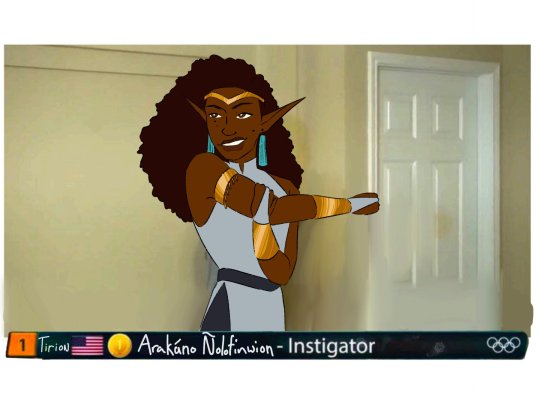
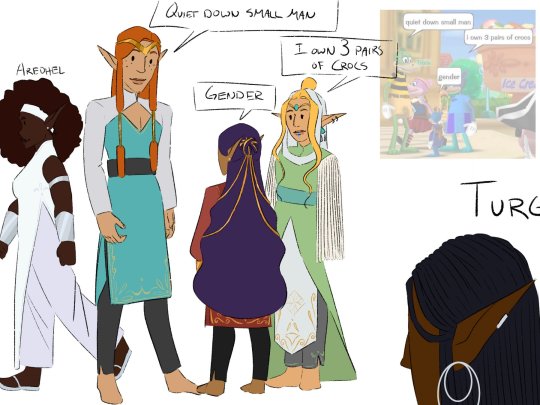
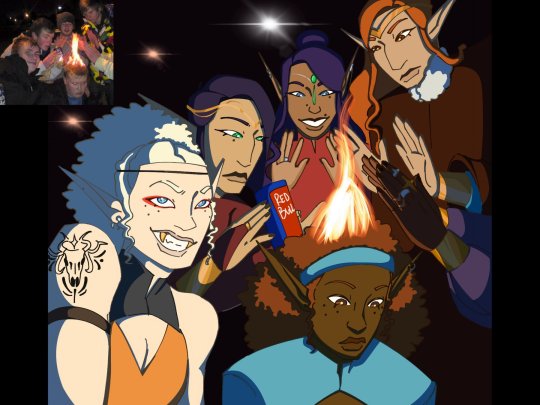
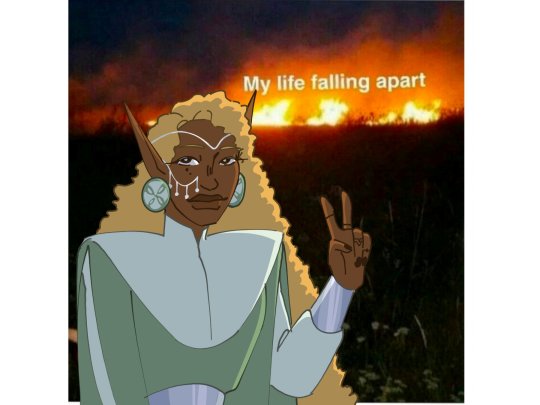


hello hi. finwean stipidity upon ye
#i think theyre the dumbest bitches out there when theyre not being hypercompetent#also i think the ambarussa deserve to be not-exactly identical. let them hve personality cowards#that 4th pic is finarfin btw. post darkening valinor CANNOT have been fun to be high king of. especially when ur family just killed people#and then dipped#i also probably think about argon more than is healthy. something about him intrigues me so#anyway tag time#tolkien#xiphoids art#silmarillion#the silmarillion#argon#aredhel#maedhros#maglor#finrod#celegorm#curufin#amrod#caranthir#finarfin#amras#ambarussa#these r all in order of appearance for yall so godspeed folks#turgons in there but barely so im not fucking tagging him#sorry man but thats just how it goes
48 notes
·
View notes
Text
reading the silm is a humbling experience:
there is so much information on each page that at the end of a chapter you think you read half the book, but when you go count, it was really 7 pages
#this book is something to read#but anyways i'm loving this#silm#tolkien#silmarillion#just finished the darkening of valinor and oh boy there was so much happening there#i can only fear what will come in the next chapters lmao
19 notes
·
View notes
Text
After about 8 or 9 pm, thoughts and opinions can get a little wild. I’m talking extra bitterness, heightened emotion you name it. I like to blame that on the sun going down.
Now imagine what it would be like if the sun and moon were both destroyed at the same time (but the earth somehow wasn’t.) Just. Sudden darkness, confusion, fear, bitterness, heightened emotion.
That’s what the Darkening of Valinor was like.
9 notes
·
View notes